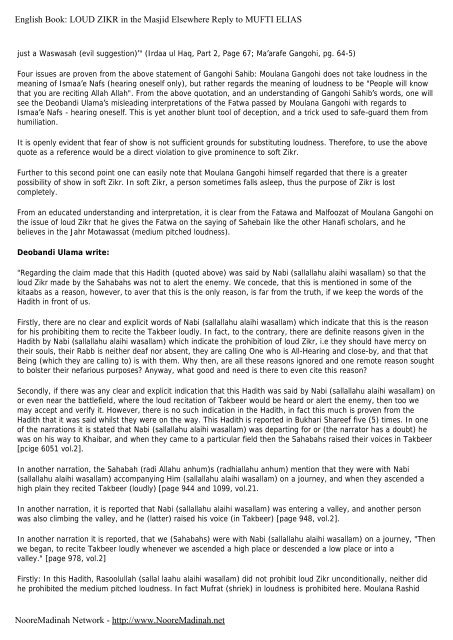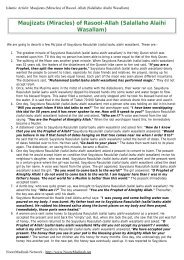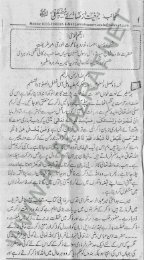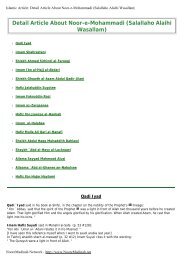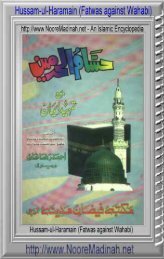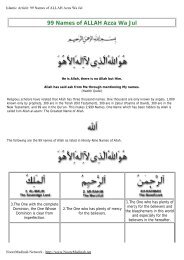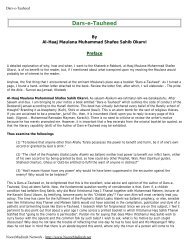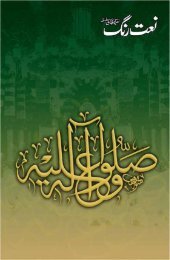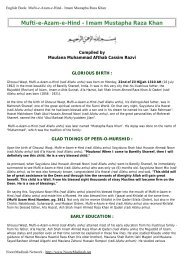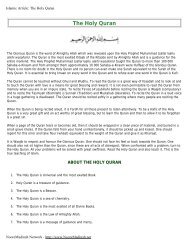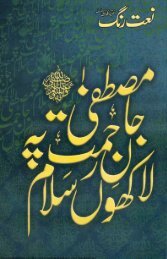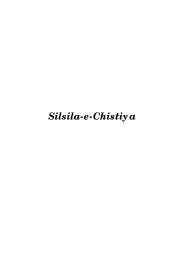LOUD ZIKR in the Masjid & Elsewhere & Reply to MUFTI ELIAS
LOUD ZIKR in the Masjid & Elsewhere & Reply to MUFTI ELIAS
LOUD ZIKR in the Masjid & Elsewhere & Reply to MUFTI ELIAS
You also want an ePaper? Increase the reach of your titles
YUMPU automatically turns print PDFs into web optimized ePapers that Google loves.
English Book: <strong>LOUD</strong> <strong>ZIKR</strong> <strong>in</strong> <strong>the</strong> <strong>Masjid</strong> <strong>Elsewhere</strong> <strong>Reply</strong> <strong>to</strong> <strong>MUFTI</strong> <strong>ELIAS</strong><br />
just a Waswasah (evil suggestion)’" (Irdaa ul Haq, Part 2, Page 67; Ma’arafe Gangohi, pg. 64-5)<br />
Four issues are proven from <strong>the</strong> above statement of Gangohi Sahib: Moulana Gangohi does not take loudness <strong>in</strong> <strong>the</strong><br />
mean<strong>in</strong>g of Ismaa’e Nafs (hear<strong>in</strong>g oneself only), but ra<strong>the</strong>r regards <strong>the</strong> mean<strong>in</strong>g of loudness <strong>to</strong> be "People will know<br />
that you are recit<strong>in</strong>g Allah Allah". From <strong>the</strong> above quotation, and an understand<strong>in</strong>g of Gangohi Sahib’s words, one will<br />
see <strong>the</strong> Deobandi Ulama’s mislead<strong>in</strong>g <strong>in</strong>terpretations of <strong>the</strong> Fatwa passed by Moulana Gangohi with regards <strong>to</strong><br />
Ismaa’e Nafs - hear<strong>in</strong>g oneself. This is yet ano<strong>the</strong>r blunt <strong>to</strong>ol of deception, and a trick used <strong>to</strong> safe-guard <strong>the</strong>m from<br />
humiliation.<br />
It is openly evident that fear of show is not sufficient grounds for substitut<strong>in</strong>g loudness. Therefore, <strong>to</strong> use <strong>the</strong> above<br />
quote as a reference would be a direct violation <strong>to</strong> give prom<strong>in</strong>ence <strong>to</strong> soft Zikr.<br />
Fur<strong>the</strong>r <strong>to</strong> this second po<strong>in</strong>t one can easily note that Moulana Gangohi himself regarded that <strong>the</strong>re is a greater<br />
possibility of show <strong>in</strong> soft Zikr. In soft Zikr, a person sometimes falls asleep, thus <strong>the</strong> purpose of Zikr is lost<br />
completely.<br />
From an educated understand<strong>in</strong>g and <strong>in</strong>terpretation, it is clear from <strong>the</strong> Fatawa and Malfoozat of Moulana Gangohi on<br />
<strong>the</strong> issue of loud Zikr that he gives <strong>the</strong> Fatwa on <strong>the</strong> say<strong>in</strong>g of Saheba<strong>in</strong> like <strong>the</strong> o<strong>the</strong>r Hanafi scholars, and he<br />
believes <strong>in</strong> <strong>the</strong> Jahr Motawassat (medium pitched loudness).<br />
Deobandi Ulama write:<br />
"Regard<strong>in</strong>g <strong>the</strong> claim made that this Hadith (quoted above) was said by Nabi (sallallahu alaihi wasallam) so that <strong>the</strong><br />
loud Zikr made by <strong>the</strong> Sahabahs was not <strong>to</strong> alert <strong>the</strong> enemy. We concede, that this is mentioned <strong>in</strong> some of <strong>the</strong><br />
kitaabs as a reason, however, <strong>to</strong> aver that this is <strong>the</strong> only reason, is far from <strong>the</strong> truth, if we keep <strong>the</strong> words of <strong>the</strong><br />
Hadith <strong>in</strong> front of us.<br />
Firstly, <strong>the</strong>re are no clear and explicit words of Nabi (sallallahu alaihi wasallam) which <strong>in</strong>dicate that this is <strong>the</strong> reason<br />
for his prohibit<strong>in</strong>g <strong>the</strong>m <strong>to</strong> recite <strong>the</strong> Takbeer loudly. In fact, <strong>to</strong> <strong>the</strong> contrary, <strong>the</strong>re are def<strong>in</strong>ite reasons given <strong>in</strong> <strong>the</strong><br />
Hadith by Nabi (sallallahu alaihi wasallam) which <strong>in</strong>dicate <strong>the</strong> prohibition of loud Zikr, i.e <strong>the</strong>y should have mercy on<br />
<strong>the</strong>ir souls, <strong>the</strong>ir Rabb is nei<strong>the</strong>r deaf nor absent, <strong>the</strong>y are call<strong>in</strong>g One who is All-Hear<strong>in</strong>g and close-by, and that that<br />
Be<strong>in</strong>g (which <strong>the</strong>y are call<strong>in</strong>g <strong>to</strong>) is with <strong>the</strong>m. Why <strong>the</strong>n, are all <strong>the</strong>se reasons ignored and one remote reason sought<br />
<strong>to</strong> bolster <strong>the</strong>ir nefarious purposes? Anyway, what good and need is <strong>the</strong>re <strong>to</strong> even cite this reason?<br />
Secondly, if <strong>the</strong>re was any clear and explicit <strong>in</strong>dication that this Hadith was said by Nabi (sallallahu alaihi wasallam) on<br />
or even near <strong>the</strong> battlefield, where <strong>the</strong> loud recitation of Takbeer would be heard or alert <strong>the</strong> enemy, <strong>the</strong>n <strong>to</strong>o we<br />
may accept and verify it. However, <strong>the</strong>re is no such <strong>in</strong>dication <strong>in</strong> <strong>the</strong> Hadith, <strong>in</strong> fact this much is proven from <strong>the</strong><br />
Hadith that it was said whilst <strong>the</strong>y were on <strong>the</strong> way. This Hadith is reported <strong>in</strong> Bukhari Shareef five (5) times. In one<br />
of <strong>the</strong> narrations it is stated that Nabi (sallallahu alaihi wasallam) was depart<strong>in</strong>g for or (<strong>the</strong> narra<strong>to</strong>r has a doubt) he<br />
was on his way <strong>to</strong> Khaibar, and when <strong>the</strong>y came <strong>to</strong> a particular field <strong>the</strong>n <strong>the</strong> Sahabahs raised <strong>the</strong>ir voices <strong>in</strong> Takbeer<br />
[pcige 6051 vol.2].<br />
In ano<strong>the</strong>r narration, <strong>the</strong> Sahabah (radi Allahu anhum)s (radhiallahu anhum) mention that <strong>the</strong>y were with Nabi<br />
(sallallahu alaihi wasallam) accompany<strong>in</strong>g Him (sallallahu alaihi wasallam) on a journey, and when <strong>the</strong>y ascended a<br />
high pla<strong>in</strong> <strong>the</strong>y recited Takbeer (loudly) [page 944 and 1099, vol.21.<br />
In ano<strong>the</strong>r narration, it is reported that Nabi (sallallahu alaihi wasallam) was enter<strong>in</strong>g a valley, and ano<strong>the</strong>r person<br />
was also climb<strong>in</strong>g <strong>the</strong> valley, and he (latter) raised his voice (<strong>in</strong> Takbeer) [page 948, vol.2].<br />
In ano<strong>the</strong>r narration it is reported, that we (Sahabahs) were with Nabi (sallallahu alaihi wasallam) on a journey, "Then<br />
we began, <strong>to</strong> recite Takbeer loudly whenever we ascended a high place or descended a low place or <strong>in</strong><strong>to</strong> a<br />
valley." [page 978, vol.2]<br />
Firstly: In this Hadith, Rasoolullah (sallal laahu alaihi wasallam) did not prohibit loud Zikr unconditionally, nei<strong>the</strong>r did<br />
he prohibited <strong>the</strong> medium pitched loudness. In fact Mufrat (shriek) <strong>in</strong> loudness is prohibited here. Moulana Rashid<br />
NooreMad<strong>in</strong>ah Network - http://www.NooreMad<strong>in</strong>ah.net


